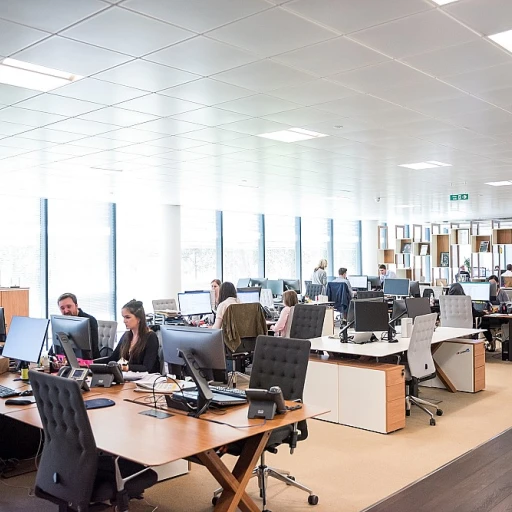
Key Responsibilities of a Medical Office Manager
Overseeing Administrative Functions
One of the primary responsibilities of a medical office manager is to oversee the administrative functions within a healthcare setting. This includes managing daily operations such as scheduling, patient records, and communication between staff and patients. Office managers must ensure compliance with healthcare regulations and policies to provide a safe and efficient environment for both staff and patients.
Staff Management and Development
Medical office managers are responsible for recruiting, hiring, and training staff to ensure the office runs smoothly. This involves understanding and preparing job descriptions, conducting interviews, and making informed hiring decisions. They play a pivotal role in fostering a team-oriented atmosphere and often facilitate ongoing training and development opportunities for staff members. A sound grasp of healthcare administration is crucial in this regard.
Ensuring Quality Patient Care
Ensuring quality patient care is at the heart of a medical office manager’s duties. They work closely with healthcare providers to ensure the services offered meet the highest standards of care. This responsibility involves coordinating between patients and healthcare workers, resolving any issues, and improving patient satisfaction. Their role is pivotal in maintaining a positive and efficient medical practice environment.
Financial Management and Planning
Financial acumen is essential for a medical office manager, who must oversee budgeting, billing, and financial planning processes. This requires preparing and analyzing financial reports, setting budgets, and working on cost-efficiency strategies to improve the office’s financial health. Office managers must also ensure compliance with financial policies and procedures, making a bachelor’s degree in health management or a related field advantageous.
For a comprehensive understanding of these duties and more, consider exploring the role of a medical office manager further.
Skills and Qualifications Needed
Essential Qualifications and Abilities for Success
In the world of healthcare management, the role of a medical office manager demands a unique combination of skills and educational qualifications to effectively handle the administrative duties in a medical practice. Meeting the criteria outlined in the job description ensures not only successful job performance but also contributes to the overall efficiency of the healthcare environment. Let's explore the key skills and qualifications required to thrive in this critical position.
- Strong Interpersonal and Communication Skills: As the central point of contact for staff, healthcare providers, and patients, an office manager must excel in communication. This is crucial for maintaining harmonious work relationships and ensuring patient satisfaction.
- Healthcare Administration Knowledge: A solid understanding of healthcare regulations and compliance is crucial for the effective management of a medical office. This includes staying up-to-date with policies, procedures, and changes in healthcare laws.
- Organizational Skills: An effective manager must be able to multitask, prioritizing tasks to manage the daily operations efficiently. From scheduling to maintaining records, organizational abilities are essential.
- Problem-solving Abilities: The dynamic nature of a medical setting often presents unexpected challenges. A competent manager must be adept at quick decision-making and effective problem resolution.
- Computer Proficiency: Familiarity with medical software and electronic health records is necessary for efficient administrative work.
- Education and Experience: Typically, a bachelor's degree in healthcare administration or a related field is preferred. Additionally, practical experience in a healthcare setting or previous experience as an office manager can be highly beneficial.
The aforementioned capabilities not only help in fulfilling the responsibilities efficiently but also set the groundwork for tackling challenges faced in day-to-day operations, leading to the overall success and smooth functioning of the medical office.
Challenges Faced by Medical Office Managers
Addressing the Unique Challenges of Managing a Medical Office
Managing a medical office comes with a unique set of challenges that require comprehensive administrative and management skills. Medical office managers are responsible for ensuring that both the operational and regulatory aspects of the healthcare organization run smoothly. As policies and procedures evolve, managers must stay informed to maintain compliance with healthcare regulations.- Balancing Patient Care: While a core function of a medical office manager is to ensure the administrative side of the practice runs flawlessly, it is crucial that patient care remains a top priority. Ensuring staff adherence to healthcare regulations and focusing on patient satisfaction can be challenging when juggling daily operations.
- Staff Management: Managing staff effectively is pivotal as it has a direct impact on the atmosphere and efficiency of the medical office. This involves not only hiring skilled personnel but also setting clear job descriptions and responsibilities to cultivate a supportive and efficient work environment.
- Navigating Healthcare Regulations: Compliance healthcare is a critical area that office managers cannot overlook. They must ensure that all practices within the medical office are aligned with current healthcare laws and policies. This requires a webinar of constant learning and adaptation to new regulations.
- Technology Integration: As medical offices continue to evolve with technology, managers face the ongoing challenge of integrating new systems that enhance patient care and streamline administrative tasks. This involves training staff to work with these technologies effectively.
The Hiring Process for Medical Office Managers
Steps to Secure a Qualified Medical Office Manager
When embarking on the hiring process for a medical office manager position, it’s crucial to have a comprehensive understanding of the necessary job skills and qualifications that align with the responsibilities of the role. The process begins with crafting a clear and detailed job description that outlines the daily operations and management expectations.- Crafting an Effective Job Posting:
- Use clear and concise language to describe the manager job duties, responsibilities, and required qualifications.
- Include essential administrative skills and healthcare management experience needed to handle healthcare providers and patient care.
- Ensure compliance with healthcare regulations is highlighted, reflecting the importance of upholding clinic policies and procedures.
- Selecting Candidates:
- Review applications against the description template for prerequisites such as a bachelor’s degree in healthcare administration or related fields.
- Shortlist candidates with proven experience in managing medical practices, who possess strong managerial and administrative skills.
- Conducting Interviews:
- Prepare interview questions that assess candidates’ understanding of medical office management duties, including their approach to staff management, compliance healthcare policies, and administrative tasks.
- Evaluate their ability to manage patient care and ensure smooth office operations.
- Ensuring a Smooth Onboarding Process:
- Once a suitable candidate is chosen, provide training opportunities tailored to align with their role, enhancing their current skills with new healthcare management knowledge.
- Implement ongoing development programs to help them stay updated on future trends in medical office management.
Training and Development Opportunities
Expanding Expertise through Continuous Learning
In the ever-evolving landscape of healthcare, office managers must prioritize ongoing training and development opportunities to ensure they are equipped to handle the varied responsibilities of their role. Given the rapid changes in healthcare regulations and policies, staying updated is not just beneficial but necessary. Training in healthcare administration, patient care protocols, and management skills is crucial.
For those transitioning into the position, understanding key duties such as administrative management, compliance healthcare, and health regulations can be daunting. It is essential for new office managers to familiarize themselves with the organization's job descriptions and policies procedures adequately. On-the-job training and mentorship from experienced managers can bridge knowledge gaps effectively.
Moreover, office managers with a bachelor degree in healthcare administration or a related field may find additional training beneficial to hone specific skills such as budgeting, staff management, and patient interaction strategies. Workshops, webinars, and certification programs can offer practical insights and hands-on experience that align with their job description.
Additionally, platforms such as LinkedIn Learning and other professional development websites provide courses tailored to the intricacies of medical office management. Such resources ensure that medical office managers are well-prepared to maintain the highest standards in patient care and daily operations while continuously enhancing their career trajectory.
Future Trends in Medical Office Management
This Decade's Transformations in Medical Office Management
The role of medical office managers is more dynamic than ever due to the rapid changes in healthcare and technology. Here are some trends shaping the future of medical office management:
- Increased Integration of Technology: With technological advancements, medical office managers must ensure that staff utilize updated systems for patient records, appointments, and billing, enhancing the efficiency of daily operations.
- Focus on Patient-Centric Care: As healthcare regulations continue to emphasize patient care, office managers need to adapt policies and procedures to improve patient experience, ensuring compliance with healthcare standards.
- Adaptation to Telehealth Services: The rise of telehealth is changing how clinics operate. Managers must oversee the integration of remote healthcare services, ensuring seamless management of these digital platforms.
- Enhanced Data Security Measures: Office managers are tasked with implementing robust data protection protocols to safeguard sensitive patient information as cyber threats become more sophisticated.
- Ongoing Professional Development: As the role evolves, managers must continually upgrade their skills through training and development opportunities to effectively handle emerging challenges in healthcare administration.
The expertise required to navigate these trends calls for a combination of strategic planning, adaptability, and leadership skills. Those equipped to handle these changes are likely to excel in the role, ensuring improved clinical outcomes and patient satisfaction.













